Forbes Archibald
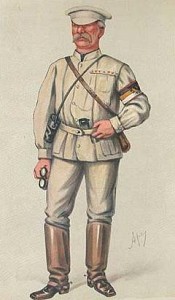
Archibald Forbes (17 April 1838–30 March 1900) was a British war correspondent, the son of a Presbyterian minister in Morayshire, Scotland; educated at the University of Aberdeen. Entering the Royal Dragoons as a private, he gained, while in the service, considerable practical experience of military life and affairs. Being invalided from his regiment, he settled in London, and became a journalist. When the Franco-Prussian War broke out in 1870, Forbes was sent to the front as war correspondent, and in this capacity he gained valuable information as to the plans of the Parisians for withstanding a siege. Transferring his services to the Daily News, his brilliant feats in the transmission of intelligence drew worldwide attention to his dispatches. He was with the German army from the beginning of the campaign, and he afterwards witnessed the rise and fall of the Paris Commune. Thereafter, Forbes proceeded to Spain, where he chronicled the outbreak of the second Carlist War; but his work here was interrupted by a visit to India, where he spent eight months upon a mission of investigation into the Bengal famine of 1873–74. Then he returned to Spain, and followed at various times the Carlist, the Republican and the Alfonsist forces. As representative of the Daily News, he accompanied the Prince of Wales in his tour through India in 1875-1876. Forbes went through the Serbian campaign of 1876, and was present at all the important engagements. In the Russo-Turkish campaign of 1877 he achieved striking journalistic successes at great personal risk. Attached to the Russian army, he witnessed most of the principal operations, and remained continuously in the field until attacked by fever. His letters, together with those of his colleagues, MacGahan and Millet, were republished by the Daily News. On recovering from his fever, Forbes proceeded to Cyprus, in order to witness the British occupation. The same year (1878) he went to India, and in the winter accompanied the Khyber Pass force to Jalalabad. He was present at the taking of Ali Musjid, and marched with several expeditions against the hill tribes. Burma was Forbes's next field of adventure, and at Mandalay, the capital, he had several interviews with King Thibaw. In 1879, he left Burma hurriedly for South Africa, where, in consequence of the disaster at Isandlwana, a British force was collecting for the invasion of Zululand. He was present at the victory of Ulundi. Forbes subsequently delivered many lectures on his war experiences to large audiences. His closing years were spent in literary work. After the Franco-Prussian War, he had published My experiences of the war between France and Germany, and a military novel entitled Drawn from Life (1871). These were followed by numerous publications after his retirement from active journalism, including Glimpses through the Cannon Smoke (1881); Chinese Gordon, a succinct record of his life (1884); Souvenirs of some Continents (1885); William I. of Germany: a Biography (1888); Havelock, in the English Men of Action Series (1890); Barracks, Bivouacs, and Battles (1891); The Afghan Wars (1892); Czar and Sultan (1895); Memories and Studies of War and Peace (1895), in many respects autobiographical; and Colin Campbell, Lord Clyde (1896).
do you like this author?
What readers are saying
What do you think? Write your own comment on this book!
write a commentWhat readers are saying
What do you think? Write your own comment on this author!
write a commentBook list
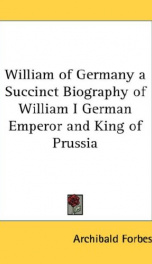
william of germany a succinct biography of william i german emperor and king
Series:
Unknown
Year:
Unknown
Raiting:
2.5/5
biographical work, devoted toWilhelm the Great, by Archibald Forbes (1838–1900), a British war correspondent. The author offers a detailed inquiry into the ancestry, parentage, childhood, youth, middle age and heroic events of this German Emperor, under whose leadership Prussia achieved the unification of Germany and the establishment of the German Empire.
Show more
add to favoritesadd In favorites

the war correspondence of the daily news 1877 with a connecting narrative fo
Series:
Unknown
Year:
Unknown
Raiting:
3/5
Show more
add to favoritesadd In favorites

the life of napoleon the third
Series:
Unknown
Year:
Unknown
Raiting:
4.5/5
Many of the earliest books, particularly those dating back to the 1900s and before, are now extremely scarce and increasingly expensive. We are republishing these classic works in affordable, high quality, modern editions, using the original text and artwork.
Show more
add to favoritesadd In favorites
Book list

william of germany a succinct biography of william i german emperor and king
Series:
Unknown
Year:
Unknown
Raiting:
2.5/5
biographical work, devoted toWilhelm the Great, by Archibald Forbes (1838–1900), a British war correspondent. The author offers a detailed inquiry into the ancestry, parentage, childhood, youth, middle age and heroic events of this German Emperor, under whose leadership Prussia achieved the unification of Germany and the establishment of the German Empire.
Show more
add to favoritesadd In favorites

the war correspondence of the daily news 1877 with a connecting narrative fo
Series:
Unknown
Year:
Unknown
Raiting:
3/5
Show more
add to favoritesadd In favorites

the life of napoleon the third
Series:
Unknown
Year:
Unknown
Raiting:
4.5/5
Many of the earliest books, particularly those dating back to the 1900s and before, are now extremely scarce and increasingly expensive. We are republishing these classic works in affordable, high quality, modern editions, using the original text and artwork.
Show more
add to favoritesadd In favorites

souvenirs of some continents
Series:
Unknown
Year:
Unknown
Raiting:
4/5
This Elibron Classics book is a facsimile reprint of a 1885 edition by Macmillan and Co., London. --This text refers to an alternate Paperback edition.
Show more
add to favoritesadd In favorites

my experiences of the war between france and germany volume 2
Series:
Unknown
Year:
Unknown
Raiting:
3.5/5
This Elibron Classics book is a facsimile reprint of a 1871 edition by Bernhard Tauchnitz, Leipzig.
Show more
add to favoritesadd In favorites

memories and studies of war and peace
Series:
Unknown
Year:
Unknown
Raiting:
4.5/5
Purchase of this book includes free trial access to www.million-books.com where you can read more than a million books for free. This is an OCR edition with typos. Excerpt from book: III. THE DARK DAYS OF SEDAN. The discrepancies about SedanMaeMahon woundedNapoleon in the Field Ducrot in CommandWimpfen supersedes himNapoleon and Ducrot in the Sous-PrefectureWimpfen's contumacyThe Final Bombardment and the White FlagBronsart's return from SedanArrival of Reille on the King's HillLetters of Napoleon and the Prussian KingThe Hymn of Victory : " Nun danket alle Gott"Bismarck's supper in Donchery The Midnight ConferenceNapoleon's exit from SedanThe Weaver's CottageThe interview in the Chateau Bellevue after CapitulationThe French prisoner-Army on the Peninsula of IgesThe last of the Weaver's CottageEnd of Madame Fournaise. ONE day, no doubt, the inevitable historian will undertake the task of writing a detailed account of the strange events which occurred about Sedan during the first week of September, 1870; but if in the endeavour he escapes falling a victim to softening of the brain, he may be accounted an exceptionally fortunate man. With certain salient facts, it is true, no difficulties will present themselves. It is unquestionable that a great battle was fought on the 1st, resulting in the defeat and surrender of the French army; that Marshal MaeMahon, the French commander-in-chief, was struck down wounded in the early morning of that day; that on the same afternoon the white flag was hoisted by order of the Emperor Napoleon, who sent out to the German monarch a letter tendering the surrender of his sword; that Napoleon on the early morning of the 2nd came out from Sedan, and met and conferred with Bismarck at the weaver's cottage on the Donchery road; that, subsequently, the capitulation of the French army having been consummated, he had an interview with King Wilhelm in the Chateau Bellevue; that on the following morning he start... --This text refers to an alternate Paperback edition.
Show more
add to favoritesadd In favorites

havelock
Series:
Unknown
Year:
Unknown
Raiting:
4.5/5
Purchase of this book includes free trial access to www.million-books.com where you can read more than a million books for free. This is an OCR edition with typos. Excerpt from book: CHAPTER III GWALIOR AND THE PUNJAB In the shower of promotions which descended copiously on the army whose return from Afghanistan Lord Ellenborough greeted with so great effusion, Havelock did not participate. He went forth toward Afghanistan a captain in 1838; a captain he came out in the end of 1842. The only souvenir given him of his service beyond the Indus was what he called "a bit of red ribbon"; he was made a C.B. for his prominent share in the defeat of Akbar Khan outside Jellalabad on April 7th, 1842. When the Ferozepore ceremonials were finished he reverted to regimental duty, and for three months concerned himself with " the oversight of the shirts and stockings of No. 4 Company of H.M.'s Thirteenth Light Infantry." From April to October 1843, he was on leave at Simla with Mrs. Havelock. Near the end of his stay there he got his majority without purchase, and never subsequently did a stroke of regimental duty. Immediately on his promotion he was made Persian interpreter on the staff of the new Commander-in-Chief, Sir Hugh Gough, whose camp he joined at Cawnpore in the end of October, in time to participate in the short Gwalior campaign. The Afghan disasters had sensibly altered the tone of the native states in their relations with the British raj. The Mahratta state of Gwalior had a mercenary army of a strength quite disproportioned to its requirements, its revenue, and its population. It consisted of thirty thousand regular infantry, ten thousand cavalry, and two hundred guns, and was commanded and disciplined by officers of European descent. The troops, conscious of their strength, had the mastery in the state, resisted the reduction of their numbers, and constituted a standing menace on our frontier. A conspiracy, resulting in the expulsion of the Reg...
Show more
add to favoritesadd In favorites
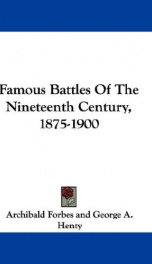
famous battles of the nineteenth century 1875 1900
Series:
Unknown
Year:
Unknown
Raiting:
3/5
This scarce antiquarian book is included in our special Legacy Reprint Series. In the interest of creating a more extensive selection of rare historical book reprints, we have chosen to reproduce this title even though it may possibly have occasional imperfections such as missing and blurred pages, missing text, poor pictures, markings, dark backgrounds and other reproduction issues beyond our control. Because this work is culturally important, we have made it available as a part of our commitment to protecting, preserving and promoting the world's literature.
Show more
add to favoritesadd In favorites
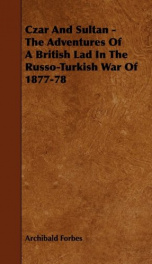
czar and sultan
Series:
Unknown
Year:
Unknown
Raiting:
3.5/5
Many of the earliest books, particularly those dating back to the 1900s and before, are now extremely scarce and increasingly expensive. We are republishing these classic works in affordable, high quality, modern editions, using the original text and artwork.
Show more
add to favoritesadd In favorites

colin campbell lord clyde
Series:
Unknown
Year:
Unknown
Raiting:
3/5
This Elibron Classics book is a facsimile reprint of a 1895 edition by Macmillan and Co., London. --This text refers to an alternate Paperback edition.
Show more
add to favoritesadd In favorites
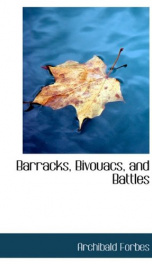
barracks bivouacs and battles
Series:
Unknown
Year:
Unknown
Raiting:
4.5/5
1891. Forbes, a brilliant war correspondent, spent his later years in literary work. Contents: How The Crayture Got on the Strength; The Fate of Nana Sahib's Englishman; The Old Sergeant; The Gentleman Private of the Skilamalinks; Jellypod; Alias the Muleteer; The Double Coup de Grace; Bill Beresford and his Victoria Cross; La Belle Helene of Alexinatz; An Outpost Adventure; The Divine Figure from the North; A Yarn of the President Frigate; Fire-Discipline; A Christmas Dinner de Profundis; Absit Omen!; A Forgotten Rebellion; and My Campaign in Pall Mall. See other titles by this author available from Kessinger Publishing. --This text refers to an alternate Paperback edition.
Show more
add to favoritesadd In favorites

Camps, Quarters, and Casual Places
Series:
Unknown
Year:
Unknown
Raiting:
4/5
Purchase of this book includes free trial access to www.million-books.com where you can read more than a million books for free. This is an OCR edition with typos. Excerpt from book: GERMAN WAR PRAYERS 1870-71 In the multifarious ramifications of their military organisation the Germans by no means neglect religion. Each army corps is partitioned into two divisions and each division has its field chaplain. In those corps in which there is a large admixture of the Catholic element, there is a cleric of that denomination to each division as well as a Protestant chaplain. The former is known as a Feld- geistliger, a word which in itself means nothing more distinctive than a " field ecclesiastic," while the Protestant chaplain has usually the title of Feld- pastor. Of the priest I can say but little. The pastors, for the most part, are young and energetic men. They may be divided into two classes: those who have at home no stated charges, and those who have temporarily left their charge for the duration of the war. The former generally are regularly posted to a division ; the latter, equally recognised but not perhaps quite so official, are chiefly to be found in the lazarettoes, in the battlefield villages whither the wounded are borne to have their fresh wounds roughly seen to, and on the battlefield itself. Not that theregular divisional chaplains do not face the dangers of the battlefield with devoted courage ; but their duties, in the nature of their special avocation, lie more among the hale and sound who yet stand up before an enemy, than with the poor fellows who have been stricken down. Earnestness and devotion are the chief characteristics of those pastors. It struck me that their education was not of a very high ordercertainly not on a par with that of the average regimental officer. The Feldpastor wears an armlet of white and light purple to denote his calling ; but indeed it is not easy to mistake him for anything else than he is. He has h...
Show more
add to favoritesadd In favorites
What readers are saying
What do you think? Write your own comment on this author!
write a commentif you like Forbes Archibald try:
readers also enjoyed
What readers are saying
What do you think? Write your own comment on this author!
write a commentGenre
if you like Forbes Archibald try:
readers also enjoyed
Do you want to read a book that interests you? It’s EASY!
Create an account and send a request for reading to other users on the Webpage of the book!


